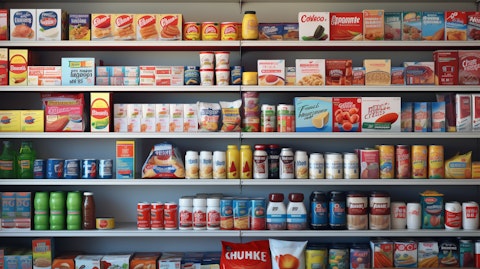We recently compiled a list of the 10 Best FTSE Dividend Stocks To Buy Now. In this article, we are going to take a look at where Unilever PLC (NYSE:UL) stands against the other FTSE dividend stocks.
Goldman Sachs Research predicts moderate growth for the UK economy in 2025, with GDP rising 1.2%. That is slightly below the Bank of England’s (BoE) 1.5% projection and the 1.3% consensus among economists. Moreover, growth is expected to slow as the year goes on, driven by trade uncertainties, tighter budgets, and changes in housing policies. However, inflation is likely to ease through 2025, which could lead to bigger interest rate cuts than the market expects. While most think the BoE will stop cutting rates at 4%, Goldman Sachs sees rates dropping further to 3.25% by mid-2026.
Building on this cautious economic outlook, fiscal policies are also expected to play a significant role in shaping growth. The UK’s autumn budget provided a near-term boost to demand but points to a consolidation in 2025, likely slowing growth later in the year. Inflationary pressures from public sector pay deals and higher taxes on services are expected to persist in the short term but should ease as wage growth slows and labor market tightness lessens.
Amid these broader economic challenges, UK investors may find some optimism in corporate dividends. AJ Bell’s latest Dividend Dashboard paints a positive picture for FTSE 100 dividends. Analysts expect payouts to grow by 1% in 2024 to £78.6 billion, followed by a 7% bump in 2025 to £83.9 billion, though still just shy of the 2018 record of £85.2 billion. This strong performance in dividends highlights a contrast to the broader economic challenges, offering a silver lining for investors. Share buybacks remain strong, with £49.9 billion already planned for 2024, on top of £52 billion last year. Combined with £11 billion in expected dividends from the FTSE 250 and £47.2 billion in takeovers, the FTSE 350 is set to deliver a whopping £189.7 billion in total cash returns. That works out to a cash yield of 7.7%, comfortably beating the Bank of England’s 5% base rate, the 3.92% 10-year gilt yield, and the 2.2% inflation rate.
Nevertheless, domestic companies are still grappling with significant headwinds, such as rising costs like National Insurance and minimum wage, all while operating in a sluggish economy. Investors are still favoring the US market, but falling interest rates could nudge some back toward UK stocks. Meanwhile, rising bond yields and pension plans shifting to UK equities might help stocks but could drive up government borrowing costs by reducing demand for gilts.
Our Methodology
For this article, we used the iShares Core FTSE 100 UCITS ETF. The fund aims to replicate the performance of an index comprising the 100 largest companies in the UK. From this fund, we focused on picking prominent stocks with stable yields and strong dividend policies. The list below is ranked in the ascending order of dividend yield as of January 3.
At Insider Monkey, we are obsessed with the stocks that hedge funds pile into. The reason is simple: our research has shown that we can outperform the market by imitating the top stock picks of the best hedge funds. Our quarterly newsletter’s strategy selects 14 small-cap and large-cap stocks every quarter and has returned 275% since May 2014, beating its benchmark by 150 percentage points (see more details here)

A supermarket shelf overflowing with a variety of fast-moving consumer goods.
Unilever PLC (NYSE:UL)
Dividend Yield as of January 3: 3.37%
Number of Hedge Fund Holders: 22
Unilever PLC (NYSE:UL), founded in 1860 and headquartered in London, is a global consumer goods company operating in Asia Pacific, Africa, the Americas, and Europe. It offers products like hair and skincare, soap, fabric care, cooking aids, and ice cream. Unilever is one of the best FTSE dividend stocks to invest in.
In Q3, Unilever PLC (NYSE:UL) reported 4.5% underlying sales growth and 3.6% volume growth, marking the fourth consecutive quarter of positive volume growth. All business groups achieved positive volume growth, with Power Brands leading the way at 5.4%. Beauty & Wellbeing saw 6.7% sales growth, driven by strong performance in Health & Wellbeing. Personal Care grew 4.4%, and Ice Cream rose 9.8% due to operational improvements. Developed markets grew 6.9%, while emerging markets saw a 2.9% increase. However, growth was slower in regions like China and South East Asia. Turnover reached €15.2 billion, unchanged from the previous year, despite currency and disposal impacts.
In February 2024, Unilever PLC (NYSE:UL) announced a €1.5 billion share buyback program for the year. The first tranche of €700 million was completed in August, and the second tranche of up to €800 million began in September, set to finish in December 2024. The interim dividend for Q2 was increased by 3.0% to €0.4396, and the dividend for Q3 was maintained at this level.
Among the hedge funds tracked by Insider Monkey, 22 funds were bullish on Unilever PLC (NYSE:UL), compared to 21 in the last quarter. Ken Fisher’s Fisher Asset Management is the largest stakeholder in the company, with 16.7 million shares worth $1 billion.
Overall UL ranks 9th on our list of the best FTSE dividend stocks to buy now. While we acknowledge the potential of UL as an investment, our conviction lies in the belief that certain AI stocks hold greater promise for delivering higher returns, and doing so within a shorter time frame. If you are looking for an AI stock that is more promising than UL but that trades at less than 5 times its earnings, check out our report about the cheapest AI stock.
READ NEXT: 8 Best Wide Moat Stocks to Buy Now and 30 Most Important AI Stocks According to BlackRock.
Disclosure: None. This article is originally published at Insider Monkey.





